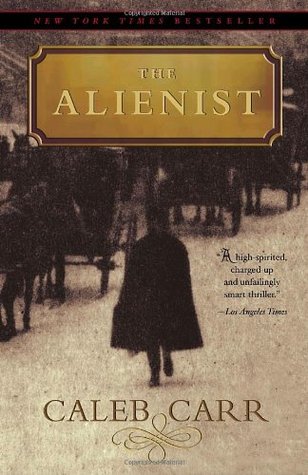Historical Fiction Annotation - The Alienist by Caleb Carr
The Alienist by Caleb Carr (Dr. Laszlo Kreizler #1)
Synopsis:
It's 1896 in New York City and someone is killing and mutilating boy prostitutes. The police want nothing to do with the murders of the least of city's denizens, but Theodore Roosevelt, the newly appointed police commissioner, is determined to bring the person responsible to justice. So he enlists his friends Dr. Laszlo Kreizler, a well-known (and largely disliked) psychologist, and John Moore, a crime beat reporter, to investigate--unbeknownst to anyone else in the department. Kreizler seeks to do something no one has ever done: create a portrait of the killer using the evidence and inference--then find the man who fits that profile. However, it's not just time and the killer they're racing against, as the city's crime bosses don't want anyone snooping in their business and even the police interfere, fearing the loss of their income through pay offs and illegal dealings. And as Kreizler and Moore draw closer, the stakes just get higher and higher--and may just cost them their lives.
Characteristics of historical fiction:
- Wealth of accurate historical detail relating to setting: Carr was a history writer before he tried his hand at fiction. The book visits New York icons, some in construction or recently constructed, and addresses the implications of recent events, such as Roosevelt's appointment as commissioner and his changes in the police department.
- Raises difficult social or moral issues through the plot: The Alienist not only addresses things like the corruption in the New York police department at the time, but it expresses a lot of sympathy and care for the plight of the children, young boys dressed as girls prostituting themselves, involved in the murders. It also views the events that bring the murderer to the edge with understanding, with Kreizler seeing how what happened to the man as a child affected his entire life--he's never fully vilified because of it.
- Characters may be real, and fit within the times (no anachronisms): Theodore Roosevelt is the largest real character, but others, such as J.P. Morgan, Jacob Riis, and Anthony Comstock, play small parts.
- Big books, with a leisurely pace: The hardcover is 496 pages, and while the book has a kind of thriller tone, it reads slowly, with lots of details. (I'm not a slow reader and it took me over a week!)
Readalikes:
Secret of the White Rose by Stefanie Pintoff
I, Ripper by Stephen Hunter
The Devil in the White City by Erik Larson
The Gods of Gotham by Lyndsay Faye

I don't usually read historical fiction, however, your annotation makes me want to read this one. I've already added it to my list of want to reads on goodreads.
ReplyDeleteI really enjoyed it! He does a good job making an ominous tone. I'd not have read it without this class, and I'm glad I did!
DeleteI've been watching this show on TNT and enjoying it, so I was excited to read your review of the book. Is there any historical accuracy to the story at all? I always wonder about that with historical fiction; what is real, what is made up, and how does the author meld the two together to create a powerful story. I'll have to see if my library has this one!
ReplyDeleteI wanted to finish the book before I started the show, but I've started it now! I'm, of course, enjoying calling out any little differences I see.
DeleteI read the author's note, but he doesn't mention anything about basing the story on any real events. It takes place not much after all the H.H. Holmes hubbub and Jack the Ripper, so I imagine those are where some of this comes from. From the sound of it, though, the state of the NYPD and the study of psychology and forensics are accurate. They use fingerprinting--and mention that it isn't an accepted method of identification!
Rachel, I am a great fan of historical fiction and I've never limited myself to a particular time period or country. I like that in our textbook Saricks points out that fans of this genre love history, but they "are not just interested in dry facts and dates; they expect history to come alive" (p. 299) and that's definitely true of me. I become invested in these fictional characters, but I want the author to paint a vivid picture of the time and place in which they live so that it is as real to me as possible!
ReplyDeleteI'd read this book when it first came out because the cover intrigued me and I think also I was reading a lot of true crime then and this was an easy segue. I haven't seen the series on TV even though it is something I think I would like to try. Thanks for an excellent annotation that doesn't give too much away!
Since I heard about the TV show that just started that is based on this book I have been thinking about reading it. It sounds even more intriguing just reading your summary. I'm going to have to add this to my to read list. I usually stick more with romance, but I like historical fiction as well and this sounds wonderful. In small ways it brings to mind the TV show Murdoch Mysteries, which I really enjoy.
ReplyDeleteHi Rachel! I read this book when it first came out, I think in 1994. I remember not liking the book, but I've pretty much blocked out all the details. Did you like Carr's writing? Devil in the White City is an excellent recommendation for someone looking for a book similar in tone to The Alienist. Great job on your annotation!
ReplyDeleteExcellent annotation, very timely with the new show out as well, I've been meaning to check this out! Your characteristics and summary are great. Full points!
ReplyDelete